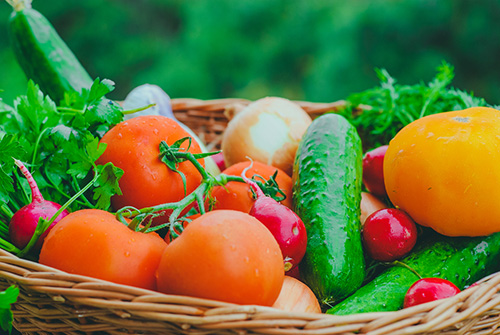
11 Sep Champion of Organic Growth
Multi-award winning vegetable grower Monika Fiebig – a leader in modern organic production – sees a bright future for this emerging sector. From the hillside of a peri-urban Adelaide suburb, Monika and her son Daniel Quattrocchi run ‘Monika’s Organic’s’ – an award winning, family-owned organic horticulture business.
Their 12-acre farm was originally purchased as a lifestyle property in 1992, but Monika’s decision to look after her young sons compelled her to consider options where she could work from home.
“I automatically thought of growing vegetables as I knew a few people in the industry. They soon became my mentors – helping me to set up my property, guiding me through basic agronomy and even buying my produce”.
The former nurse quickly developed a reputation for producing good quality bunch lines – spinach, silver beet, beetroot, leeks and spring onions and had secured buyers through her mentors. But, despite early success, Monika could see that her property size would always prevent her from being a big player in the market.
At around the same time, Monika met an organic vegetable grower from Virginia, South Australia. He invited her to look at his property and understand more about organic farming principles and the holistic approach necessary to successfully grow organic vegetables. ‘He was the catalyst – he planted a seed in my mind that organic food production systems were something I should consider in the future’. Removing all synthetic inputs and implementing a holistic approach to farming sat well with Monika, who had become increasingly uneasy with the potential negative effects of chemicals on her children, produce and the environment.
The more Monika researched, the more she realized that organic vegetables could be the niche market she was searching for. This relatively new market wasn’t saturated with suppliers, so she knew she could get a good foot in the door.
In 2002, she started the three-year conversion period to transition her property into a certified organic farm by replacing synthetic inputs with organic and biodynamic solutions.
“The move to organics was harder back then – there was a lack of information and education for growers and sourcing organic inputs was difficult. We had a crop failure because we were sold snake oil. But, we worked our way through it and it got easier as time went on”.
By the second year, Monika secured interest from buyers at the Sydney, Brisbane and Melbourne Produce Markets, ultimately becoming one of the largest suppliers of organic spring onions in Australia.
Predicting further growth in the organic food market, Monika and Daniel embarked on a longer-term a strategy in 2010 to build the business’ capacity and successfully applied for certification as an organic wholesaler and pack house.
This, in conjunction with the launch of Monika’s Organic brand, has elevated the business into a vertically integrated model. As a wholesaler, the business has access to produce from other certified organic farmers and now offers up to 40 product lines in addition to their own-grown bunch range. All produce is packed into packaged, consumer-friendly sizes, to prevent contamination with conventional items once it leaves the farm gate. Selling produce under Monika’s Organic brand allows the customers the ability to trace their food back to the source.
“When consumers buy our food, they’re getting premium quality, chemical-free, nutritional food from a source they can trust. They can be guaranteed that it’s certified organic as we pack on our farm”.
Monika’s Organics lines are supplied to Coles, Woolworths and independent supermarkets around the country – the first South Australian certified organic farm to achieve this. Looking forward, Monika knows she needs to keep her finger well and truly on the pulse in order to adapt her business to market requirements.
“We’re constantly developing in response to consumer and buyer requirements by introducing new product lines and bigger quantities. But we’ve got really good relationships with our buyers and we’re proactive in suggesting new opportunities and they’ve been very receptive to this approach”.
Closer to home, Monika and Daniel are looking to connect with their local communities by hosting groups on their farm. For the last two years, a local primary school has been bringing a class of students to the property to provide an overview of a modern working farm.
They are also planning a farm gate shop and tours for consumers to show them where and how their food is grown. For Monika, this developing curiosity in food by consumers is good news for the outlook of the sector.
“With a growing interest in food sovereignty and food as medicine, demand will increase. People want healthy, nutritious, chemical-free food, so the industry will continue to grow.”
Although organic food certainly does have an exciting future, Monika cautions that communication is key in order to protect growers and consumers.
“I think we need to better explain the difference between organic and certified organic, so customers can be sure their food is grown to the national organic standards, through a third-party verified scheme”.
Ask Monika why she believes in chemically free food, and her answer is immensely passionate. “It’s about our food, health, wellbeing, and environment. I live on my farm and I want it to be clean from chemicals and healthy so when I harvest my spinach I’m not worried about the effects on me or our customers”.Monika’s tireless commitment to organic standards as well as the promotion of the movement outside her own business has resulted in a string of national accolades. A two-time finalist in the annual AUSVEG Women in Horticulture Award, Monika was also awarded the inaugural Chairman’s Award for Industry Integrity in 2014. She is also the president of the Organic Biodynamic Alliance (OBDA) and a board member of Hortex Alliance.
